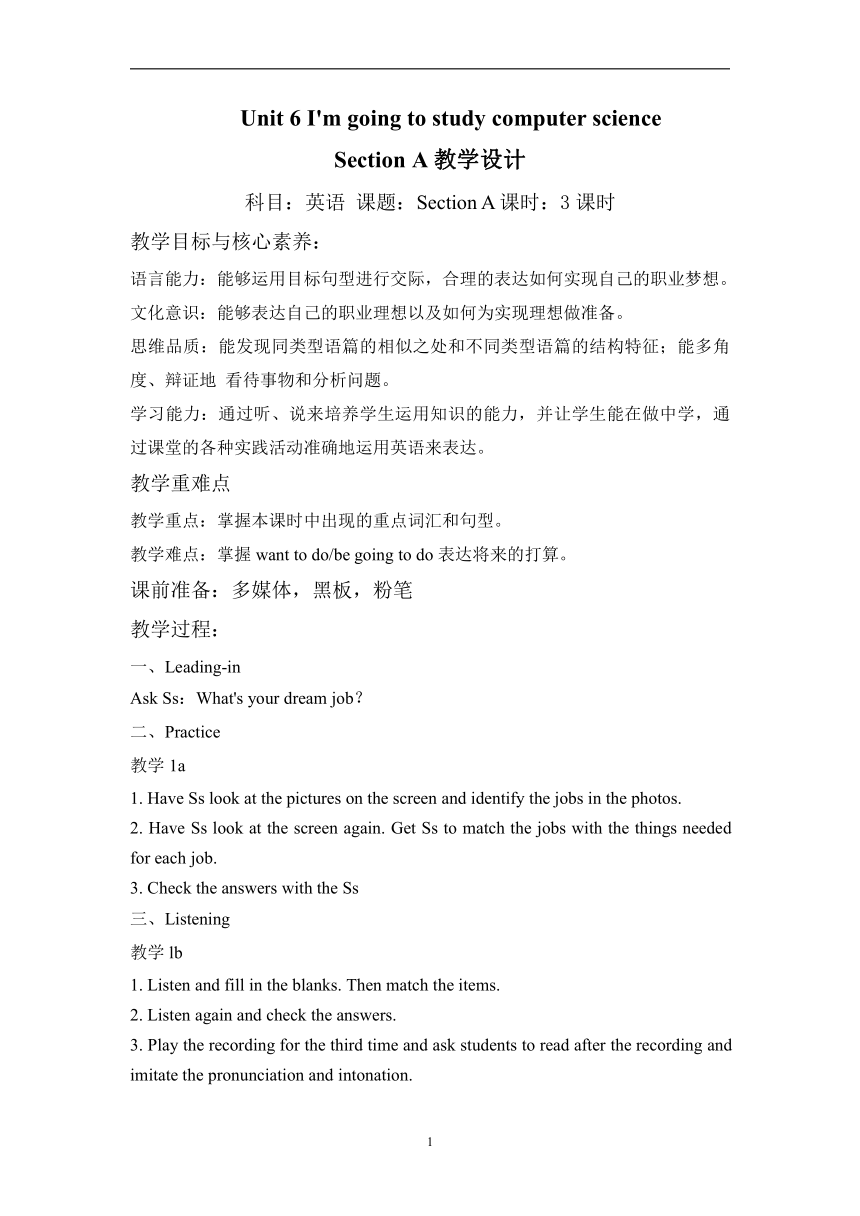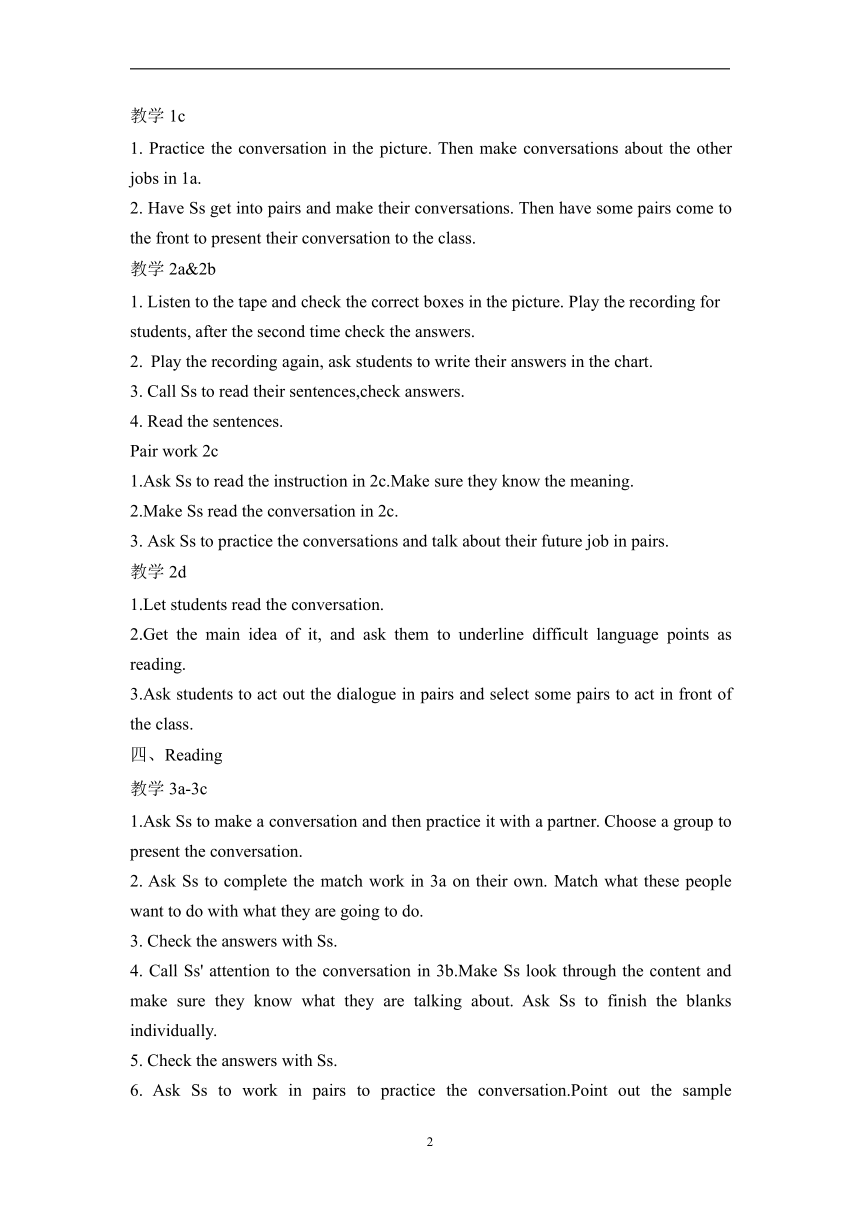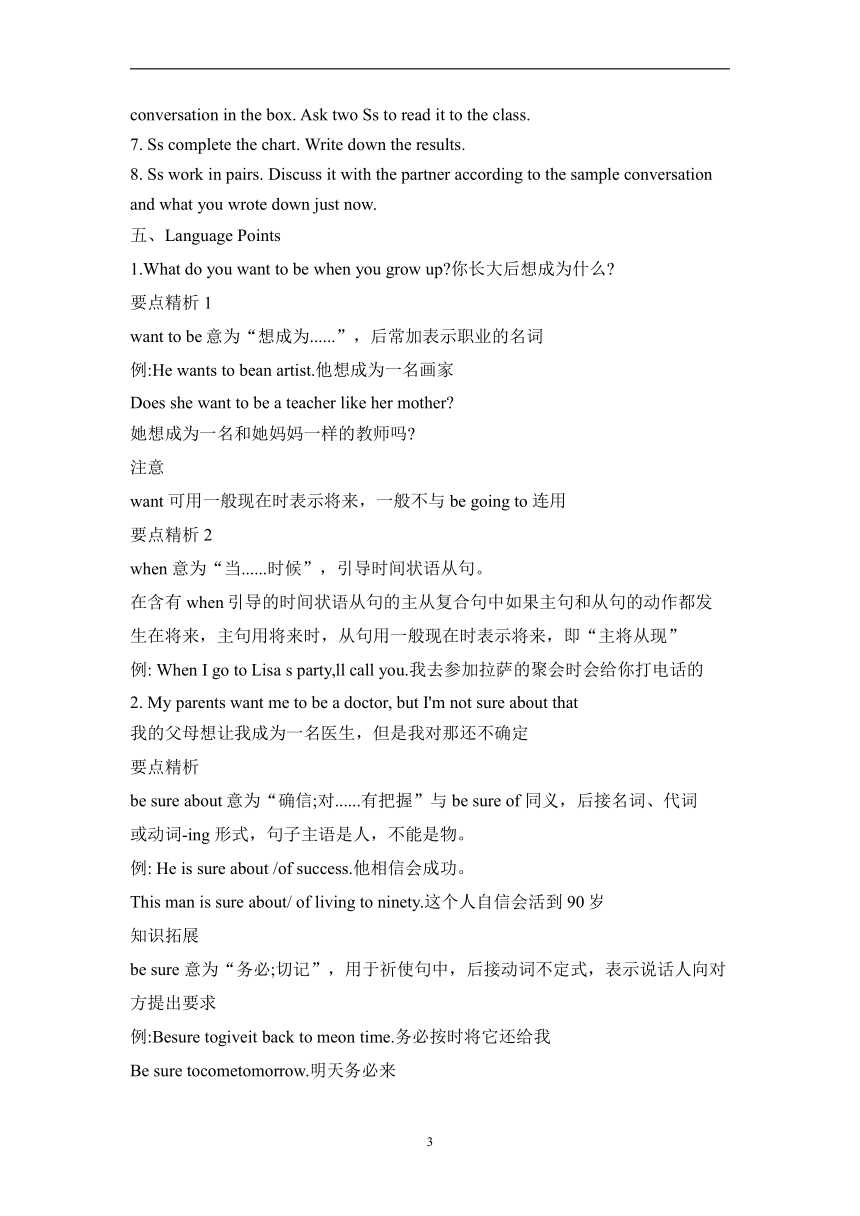Unit 6 I'm going to study computer science Section A 教案
文档属性
| 名称 | Unit 6 I'm going to study computer science Section A 教案 |

|
|
| 格式 | docx | ||
| 文件大小 | 30.3KB | ||
| 资源类型 | 教案 | ||
| 版本资源 | 人教新目标(Go for it)版 | ||
| 科目 | 英语 | ||
| 更新时间 | 2023-10-27 22:34:39 | ||
图片预览



文档简介
Unit 6 I'm going to study computer science
Section A教学设计
科目:英语 课题:Section A 课时:3课时
教学目标与核心素养:
语言能力:能够运用目标句型进行交际,合理的表达如何实现自己的职业梦想。
文化意识:能够表达自己的职业理想以及如何为实现理想做准备。
思维品质:能发现同类型语篇的相似之处和不同类型语篇的结构特征;能多角度、辩证地 看待事物和分析问题。
学习能力:通过听、说来培养学生运用知识的能力,并让学生能在做中学,通过课堂的各种实践活动准确地运用英语来表达。
教学重难点
教学重点:掌握本课时中出现的重点词汇和句型。
教学难点:掌握want to do/be going to do 表达将来的打算。
课前准备:多媒体,黑板,粉笔
教学过程:
Leading-in
Ask Ss:What's your dream job?
二、Practice
教学1a
1. Have Ss look at the pictures on the screen and identify the jobs in the photos.
2. Have Ss look at the screen again. Get Ss to match the jobs with the things needed for each job.
3. Check the answers with the Ss
三、Listening
教学lb
1. Listen and fill in the blanks. Then match the items.
2. Listen again and check the answers.
3. Play the recording for the third time and ask students to read after the recording and imitate the pronunciation and intonation.
教学1c
1. Practice the conversation in the picture. Then make conversations about the other jobs in 1a.
2. Have Ss get into pairs and make their conversations. Then have some pairs come to the front to present their conversation to the class.
教学2a&2b
1. Listen to the tape and check the correct boxes in the picture. Play the recording for students, after the second time check the answers.
2. Play the recording again, ask students to write their answers in the chart.
3. Call Ss to read their sentences,check answers.
4. Read the sentences.
Pair work 2c
1.Ask Ss to read the instruction in 2c.Make sure they know the meaning.
2.Make Ss read the conversation in 2c.
3. Ask Ss to practice the conversations and talk about their future job in pairs.
教学2d
1.Let students read the conversation.
2.Get the main idea of it, and ask them to underline difficult language points as reading.
3.Ask students to act out the dialogue in pairs and select some pairs to act in front of the class.
四、Reading
教学3a-3c
1.Ask Ss to make a conversation and then practice it with a partner. Choose a group to present the conversation.
2. Ask Ss to complete the match work in 3a on their own. Match what these people want to do with what they are going to do.
3. Check the answers with Ss.
4. Call Ss' attention to the conversation in 3b.Make Ss look through the content and make sure they know what they are talking about. Ask Ss to finish the blanks individually.
5. Check the answers with Ss.
6. Ask Ss to work in pairs to practice the conversation.Point out the sample conversation in the box. Ask two Ss to read it to the class.
7. Ss complete the chart. Write down the results.
8. Ss work in pairs. Discuss it with the partner according to the sample conversation and what you wrote down just now.
五、Language Points
1.What do you want to be when you grow up 你长大后想成为什么
要点精析 1
want to be意为“想成为......”,后常加表示职业的名词
例:He wants to bean artist.他想成为一名画家
Does she want to be a teacher like her mother
她想成为一名和她妈妈一样的教师吗
注意
want 可用一般现在时表示将来,一般不与 be going to 连用
要点精析 2
when 意为“当......时候”,引导时间状语从句。
在含有when引导的时间状语从句的主从复合句中如果主句和从句的动作都发生在将来,主句用将来时,从句用一般现在时表示将来,即“主将从现”
例: When I go to Lisa s party,ll call you.我去参加拉萨的聚会时会给你打电话的
2. My parents want me to be a doctor, but I'm not sure about that
我的父母想让我成为一名医生,但是我对那还不确定
要点精析
be sure about意为“确信;对......有把握”与 be sure of 同义,后接名词、代词
或动词-ing 形式,句子主语是人,不能是物。
例: He is sure about /of success.他相信会成功。
This man is sure about/ of living to ninety.这个人自信会活到90岁
知识拓展
be sure 意为“务必;切记”,用于祈使句中,后接动词不定式,表示说话人向对方提出要求
例:Besure togiveit back to meon time.务必按时将它还给我
Be sure tocometomorrow.明天务必来
be sure意为“一定;肯定”,后接动词不定式,表示说话人的推测或判断。主语可以是人也可以是物。
例:It's sure to rain tomorrow.明天一定会下雨
My father is sure to live to ninety.我父亲一定会活到 90岁
Obe sure+that 从句,意为“肯定......;有把握”,主句的主语是人
例:I'm sure smoking Is not good for health.我相信吸烟对健康不益
3.Not everyone knows what they want to be.不是每个人都知道他们想成为什么
要点精析
not everyone意为“不是每一个人”,是不完全否定形式
例:Not everyone likes hamburgers.不是人人都喜欢汉堡包。
知识拓展
常见的不完全否定形式
all 的否定式:not all...(或 all...not),意为“并非都......,不是所有的都......”。
例: Not all men can be masters.(=All men cannot be masters.)
并非人人都能当领导。
both 的否定式:not both.(或 both...not),意为“并非两者......都......
例:I don't want both the books.我不是两本书都想要
Both (the)windows are not open.两扇窗子并不是都开着
图every 的否定式:not every...( 或every...not),意为“不是每个.........都......
例: Not every book is educational. =Every book is not educational.
六、Grammar Focus
be going to的用法
“be going to+动词原形”结构表示将要发生的动作或安排,或打算、计划决定要做的事。常与表示将来的tomorrow,next week,in a month等时间状语连用,其中be要与主语的人称和数保持一致
1.be going to i结构的基本句型
(1)肯定句:主语+ be going to+动词原形+其他
例: I'm going to play chess with my friend.
我将要和我的朋友下国际象棋
(2)否定:主语+ be not going to+动词原形+其他
例: They are not going to play basketball this afternoon.
今天下午他们不打算打篮球。
(3)一般疑问句:Be+主语+ going to+动词原形+其他
例:Are you going to have an English lesson tomorrow 你明天有英语课吗
(4)特殊疑问句:疑问词+be+主语+ going to+动词原形+其他
例:What's he going to do this weekend 这周末他打算做什么
2.be going tog结构有以下几种用法
(1)示按计划安排或规定要发生的动作或事情
例: I'm going to visit Beijing next week.下周我将去游览北京
(2)表示根据某种迹象表明可能将要发生的动作
例: Look at the clouds. It's going to rain.看这些云。要下雨了
(3)当谓语动词为表示位置移动的动词(come,go,leave,move, travel,arrive, fly时,要用 be doing代替 be going to do.
例:Mr.Wang is coming soon.王老师很快就来了
We are leaving for Australia tomorrow. 明天我们将动身去澳大利亚
小贴士
表示“某地/某时将有.....”时,要用“There is/are going to be+主语+其他
例: There is going to be a football match tomorrow.
明天将有一场足球比赛
3.be going to与will的区别
(1)对未来事情的预测用“will+动词原形”表达,will没有人称和数的变化。变否定句要在will后加not,也可用will和not的缩写形式won't;变一般疑问句将wil提至句首。
例: Students won't use books to study.学生将不用书学习了
-Will planes be very large in the future 未来飞机会很大吗
Yes,they will. No, they won't.是的,它们会。/不,它们不会
(2)will 常表示说话人相信或希望要发生的事情,而be going to常表示事情很快就要发生
例: I believe Lucy will be a great doctor
我相信露西会成为一名很棒的医生
He is going to become successful.他就要成功了
(3)陈述将来的某个事实用will。
例:I will be ten years old next year 明年我就10岁了
(4)表示现在决定将来要做的事情用will
例: I'm tired Il go to bed.我累了。我要睡觉了
(5)表示意愿用 will。
例:I will tell you the truth.我要告诉你真相。
(6)表示计划、打算要做的事情用 be going to而不用will.
例:I'm going to buy a computer this month 这个月我打算买一台电脑
七、Homework
1. 熟练掌握和运用单词。
2. 练习对话,记忆所学的语言结构
2
Section A教学设计
科目:英语 课题:Section A 课时:3课时
教学目标与核心素养:
语言能力:能够运用目标句型进行交际,合理的表达如何实现自己的职业梦想。
文化意识:能够表达自己的职业理想以及如何为实现理想做准备。
思维品质:能发现同类型语篇的相似之处和不同类型语篇的结构特征;能多角度、辩证地 看待事物和分析问题。
学习能力:通过听、说来培养学生运用知识的能力,并让学生能在做中学,通过课堂的各种实践活动准确地运用英语来表达。
教学重难点
教学重点:掌握本课时中出现的重点词汇和句型。
教学难点:掌握want to do/be going to do 表达将来的打算。
课前准备:多媒体,黑板,粉笔
教学过程:
Leading-in
Ask Ss:What's your dream job?
二、Practice
教学1a
1. Have Ss look at the pictures on the screen and identify the jobs in the photos.
2. Have Ss look at the screen again. Get Ss to match the jobs with the things needed for each job.
3. Check the answers with the Ss
三、Listening
教学lb
1. Listen and fill in the blanks. Then match the items.
2. Listen again and check the answers.
3. Play the recording for the third time and ask students to read after the recording and imitate the pronunciation and intonation.
教学1c
1. Practice the conversation in the picture. Then make conversations about the other jobs in 1a.
2. Have Ss get into pairs and make their conversations. Then have some pairs come to the front to present their conversation to the class.
教学2a&2b
1. Listen to the tape and check the correct boxes in the picture. Play the recording for students, after the second time check the answers.
2. Play the recording again, ask students to write their answers in the chart.
3. Call Ss to read their sentences,check answers.
4. Read the sentences.
Pair work 2c
1.Ask Ss to read the instruction in 2c.Make sure they know the meaning.
2.Make Ss read the conversation in 2c.
3. Ask Ss to practice the conversations and talk about their future job in pairs.
教学2d
1.Let students read the conversation.
2.Get the main idea of it, and ask them to underline difficult language points as reading.
3.Ask students to act out the dialogue in pairs and select some pairs to act in front of the class.
四、Reading
教学3a-3c
1.Ask Ss to make a conversation and then practice it with a partner. Choose a group to present the conversation.
2. Ask Ss to complete the match work in 3a on their own. Match what these people want to do with what they are going to do.
3. Check the answers with Ss.
4. Call Ss' attention to the conversation in 3b.Make Ss look through the content and make sure they know what they are talking about. Ask Ss to finish the blanks individually.
5. Check the answers with Ss.
6. Ask Ss to work in pairs to practice the conversation.Point out the sample conversation in the box. Ask two Ss to read it to the class.
7. Ss complete the chart. Write down the results.
8. Ss work in pairs. Discuss it with the partner according to the sample conversation and what you wrote down just now.
五、Language Points
1.What do you want to be when you grow up 你长大后想成为什么
要点精析 1
want to be意为“想成为......”,后常加表示职业的名词
例:He wants to bean artist.他想成为一名画家
Does she want to be a teacher like her mother
她想成为一名和她妈妈一样的教师吗
注意
want 可用一般现在时表示将来,一般不与 be going to 连用
要点精析 2
when 意为“当......时候”,引导时间状语从句。
在含有when引导的时间状语从句的主从复合句中如果主句和从句的动作都发生在将来,主句用将来时,从句用一般现在时表示将来,即“主将从现”
例: When I go to Lisa s party,ll call you.我去参加拉萨的聚会时会给你打电话的
2. My parents want me to be a doctor, but I'm not sure about that
我的父母想让我成为一名医生,但是我对那还不确定
要点精析
be sure about意为“确信;对......有把握”与 be sure of 同义,后接名词、代词
或动词-ing 形式,句子主语是人,不能是物。
例: He is sure about /of success.他相信会成功。
This man is sure about/ of living to ninety.这个人自信会活到90岁
知识拓展
be sure 意为“务必;切记”,用于祈使句中,后接动词不定式,表示说话人向对方提出要求
例:Besure togiveit back to meon time.务必按时将它还给我
Be sure tocometomorrow.明天务必来
be sure意为“一定;肯定”,后接动词不定式,表示说话人的推测或判断。主语可以是人也可以是物。
例:It's sure to rain tomorrow.明天一定会下雨
My father is sure to live to ninety.我父亲一定会活到 90岁
Obe sure+that 从句,意为“肯定......;有把握”,主句的主语是人
例:I'm sure smoking Is not good for health.我相信吸烟对健康不益
3.Not everyone knows what they want to be.不是每个人都知道他们想成为什么
要点精析
not everyone意为“不是每一个人”,是不完全否定形式
例:Not everyone likes hamburgers.不是人人都喜欢汉堡包。
知识拓展
常见的不完全否定形式
all 的否定式:not all...(或 all...not),意为“并非都......,不是所有的都......”。
例: Not all men can be masters.(=All men cannot be masters.)
并非人人都能当领导。
both 的否定式:not both.(或 both...not),意为“并非两者......都......
例:I don't want both the books.我不是两本书都想要
Both (the)windows are not open.两扇窗子并不是都开着
图every 的否定式:not every...( 或every...not),意为“不是每个.........都......
例: Not every book is educational. =Every book is not educational.
六、Grammar Focus
be going to的用法
“be going to+动词原形”结构表示将要发生的动作或安排,或打算、计划决定要做的事。常与表示将来的tomorrow,next week,in a month等时间状语连用,其中be要与主语的人称和数保持一致
1.be going to i结构的基本句型
(1)肯定句:主语+ be going to+动词原形+其他
例: I'm going to play chess with my friend.
我将要和我的朋友下国际象棋
(2)否定:主语+ be not going to+动词原形+其他
例: They are not going to play basketball this afternoon.
今天下午他们不打算打篮球。
(3)一般疑问句:Be+主语+ going to+动词原形+其他
例:Are you going to have an English lesson tomorrow 你明天有英语课吗
(4)特殊疑问句:疑问词+be+主语+ going to+动词原形+其他
例:What's he going to do this weekend 这周末他打算做什么
2.be going tog结构有以下几种用法
(1)示按计划安排或规定要发生的动作或事情
例: I'm going to visit Beijing next week.下周我将去游览北京
(2)表示根据某种迹象表明可能将要发生的动作
例: Look at the clouds. It's going to rain.看这些云。要下雨了
(3)当谓语动词为表示位置移动的动词(come,go,leave,move, travel,arrive, fly时,要用 be doing代替 be going to do.
例:Mr.Wang is coming soon.王老师很快就来了
We are leaving for Australia tomorrow. 明天我们将动身去澳大利亚
小贴士
表示“某地/某时将有.....”时,要用“There is/are going to be+主语+其他
例: There is going to be a football match tomorrow.
明天将有一场足球比赛
3.be going to与will的区别
(1)对未来事情的预测用“will+动词原形”表达,will没有人称和数的变化。变否定句要在will后加not,也可用will和not的缩写形式won't;变一般疑问句将wil提至句首。
例: Students won't use books to study.学生将不用书学习了
-Will planes be very large in the future 未来飞机会很大吗
Yes,they will. No, they won't.是的,它们会。/不,它们不会
(2)will 常表示说话人相信或希望要发生的事情,而be going to常表示事情很快就要发生
例: I believe Lucy will be a great doctor
我相信露西会成为一名很棒的医生
He is going to become successful.他就要成功了
(3)陈述将来的某个事实用will。
例:I will be ten years old next year 明年我就10岁了
(4)表示现在决定将来要做的事情用will
例: I'm tired Il go to bed.我累了。我要睡觉了
(5)表示意愿用 will。
例:I will tell you the truth.我要告诉你真相。
(6)表示计划、打算要做的事情用 be going to而不用will.
例:I'm going to buy a computer this month 这个月我打算买一台电脑
七、Homework
1. 熟练掌握和运用单词。
2. 练习对话,记忆所学的语言结构
2
同课章节目录
- Unit 1 Where did you go on vacation?
- Section A
- Section B
- Unit 2 How often do you exercise?
- Section A
- Section B
- Unit 3 I'm more outgoing than my sister.
- Section A
- Section B
- Unit 4 What's the best movie theater?
- Section A
- Section B
- Unit 5 Do you want to watch a game show?
- Section A
- Section B
- Unit 6 I'm going to study computer science.
- Section A
- Section B
- Unit 7 Will people have robots?
- Section A
- Section B
- Unit 8 How do you make a banana milk shake?
- Section A
- Section B
- Unit 9 Can you come to my party?
- Section A
- Section B
- Unit 10 If you go to the party, you'll have a grea
- Section A
- Section B
